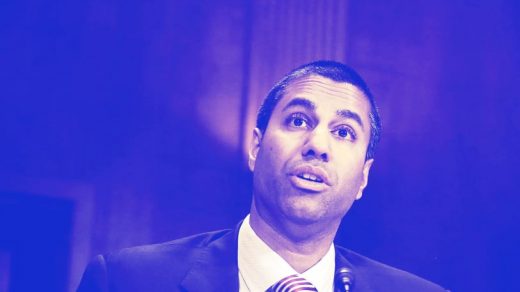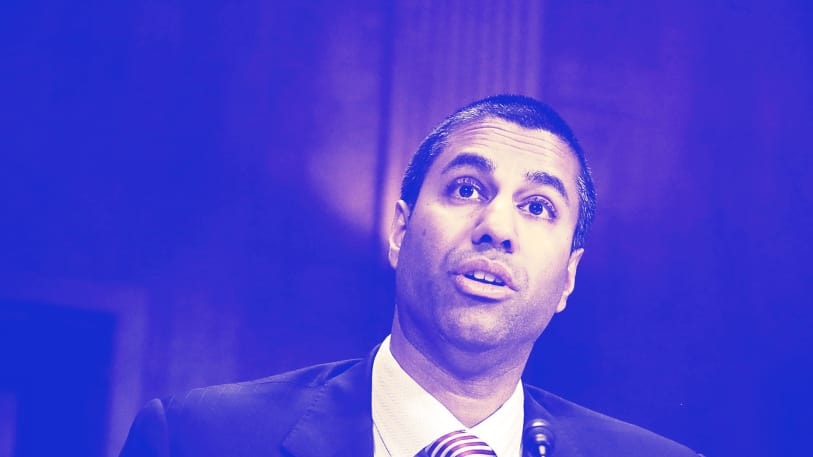Why 2017 Will Be A Huge Year For Telecom And Media Mergers
A combination of political transition, economic forces, and good timing may spark a flurry of mergers and acquisitions in the telecommunications and media industries this year.
Deregulation and market determinism are major parts of the new administration’s agenda. And the new Republican FCC chairman, Ajit Pai, isn’t likely to push against the tide when it comes to industry consolidation. Pai recently said on CNBC’s Mad Money that he’ll use a “light touch” approach to regulating the industry, and not “micromanage” the marketplace.
Pai, an ex-Verizon lawyer, was appointed chairman by Donald Trump, and Trump recently nominated him for another five-year term at the FCC. Pai was an outspoken critic of many of the agency’s actions under the leadership of ex-chairman Tom Wheeler, who was appointed by Barack Obama.
The FCC is currently engaged in a wireless spectrum auction, and will be for the next few weeks. During that time, no company that’s bidding on spectrum can hold formal discussions with potential merger partners. But after the auction is over and the prohibition lifted, M&A talks are likely to begin in earnest, industry experts tell Fast Company. And some of them will likely result in deals.
Media consolidation has been a thorny issue for Trump. On the one hand his administration has plenty of distrust and even contempt for the news media (with senior adviser Steve Bannon recently declaring that the media “is the opposition party”). On the other hand, deregulating markets (and, presumably, mergers) is a key part of Trumpism.
The biggest deal on the table right now, the proposed AT&T/Time Warner merger, provides a case in point. Trump spoke out against the merger during the campaign (Time Warner owns Trump’s arch-enemy CNN), but he has since hewed to the party line and now says he’s neutral on the matter.
FCC chairman Pai angered Senate Democrats when he decided last month not to order a full FCC review of the proposed merger, leaving only the Federal Trade Commission to examine the deal for potential antitrust violations. The political winds seem to be blowing toward an approval later this year.
Reasons For Getting Together
From a purely economic standpoint, there are good reasons for consolidation in 2017.
In the case of AT&T/Time Warner–the marriage of a telecom giant with a media giant–Time Warner is driven by its need for new wireless distribution channels that reach younger audiences on its platform of choice, smartphones. AT&T wants to sell more video content as a way of backstopping its shrinking wireless service business. Meanwhile, critics fear that putting news media like CNN into the hands of larger, and fewer, companies might harm the objectivity and influence of the press.
TV broadcasters are facing real competition from over-the-top video providers like Netflix and Amazon. Terrestrial radio stations are feeling competitive pressure from satellite radio like SiriusXM, and from streaming music services like Pandora and Spotify. This impacts viewership/listenership, and, of course, ad revenues.
Pay TV providers like Comcast continue to be squeezed by the rising costs of premium video content, and they too are feeling the effects of competition from the over-the-top video providers. Some analysts believe cable company stocks have been buoyed since the election by a belief that Trump will promote deregulation across the industry.
Wireless companies need to broaden their product offerings. Why? Selling wireless service is no longer the high-growth business it used to be. Finding new customers has gotten harder for the carriers, and competition is tight. In fact, for three of the four of the big wireless carriers, revenues have shrunk over the past year. “In what is a remarkable turn of events, Verizon’s wireless business is now a bigger drag on growth than is the wireline business,” wrote MoffettNathanson analyst Craig Moffett after hearing Verizon’s Q4 earnings. Meanwhile, the wireless carriers are now faced with the expensive prospect of rolling out fancy new 5G networks.
The M&A Answer
A common solution to all of these problems is to bulk up and/or diversify, to achieve better economies of scale through mergers and acquisitions. Combine that with a favorable political and regulatory environment, and presto!
One insider told me it’s very possible that the FCC will relax restrictions on how many radio and TV stations one company can own in a particular market. With the advent of the over-the-top providers, many people are wondering if regulating ownership by geographic market is even relevant anymore. Web TV and music know no geographic boundaries—they reach everywhere, says this source.
The same will likely be true of print publications. NPR reports that media mogul Rupert Murdoch was among those bending the ear of Trump before Pai was appointed to chair the agency. “Murdoch, who has long had his eye on the Los Angeles Times, would like federal regulators to ease or lift restrictions that prevent the owners of television stations acquiring major newspapers in the same big city.” A Pai FCC is likely to do just that.
The trend of big telecom companies buying media companies for their content will likely continue, or even accelerate.
Verizon is now finishing up its acquisition of Yahoo’s web media business, which it hopes will augment its advertising and content business. The company’s CEO, Lowell McAdam, is also seeking an answer to the AT&T/Time Warner tie-up; he said publicly he believes a merger between his company and cable provider Charter Communications would make sense. The Wall Street Journal reported McAdam had discussed a possible deal with a Charter board member. Not that Verizon is dead set on Charter. The company has in the last year considered 10 different potential mergers, Bloomberg reported.
The No. 3 wireless player, T-Mobile, is also looking for a way into video. It’s rumored to have looked seriously at buying Dish Network. Dish has the video distribution infrastructure, and established relationships with video content owners.
Even the oft-rumored T-Mobile-Sprint merger could come back to life in the current climate. Former FCC chairman Wheeler was adamant that in order to maintain healthy competition there needed to be four major wireless providers in the market. On that basis, the agency came out against AT&T’s proposed acquisition of T-Mobile. It’s not clear that Ajit Pai shares Wheeler’s views on wireless competition. Pai has said that he believes the current wireless marketplace is thrillingly competitive and capable of delivering “unparalleled value” to consumers with things like unlimited data plans. Pai might believe that a tie-up between the two smallest national wireless carriers wouldn’t do much to change that.
Cable companies are trying to augment their pay-TV business with communications services. Comcast has long talked about getting into the mobile business. The conglomerate is said to have considered buying T-Mobile as a fast way of reaching that goal. Comcast may be more likely to use an existing agreement with Verizon to sell Comcast-branded cellular service that runs over the Verizon network.
We may see pairings of traditional and non-traditional video content companies. Rumors emerged last fall that Disney was considering acquiring Netflix. It’s believed that Disney has cooled on the idea since then, but other video company mergers might make more financial sense.
The possible merger combinations are endless, and the nature of the pairings is unpredictable, but it seems likely that the number of players in the media and telecom industries will start to shrink by the end of 2017.
Fast Company , Read Full Story
(38)














